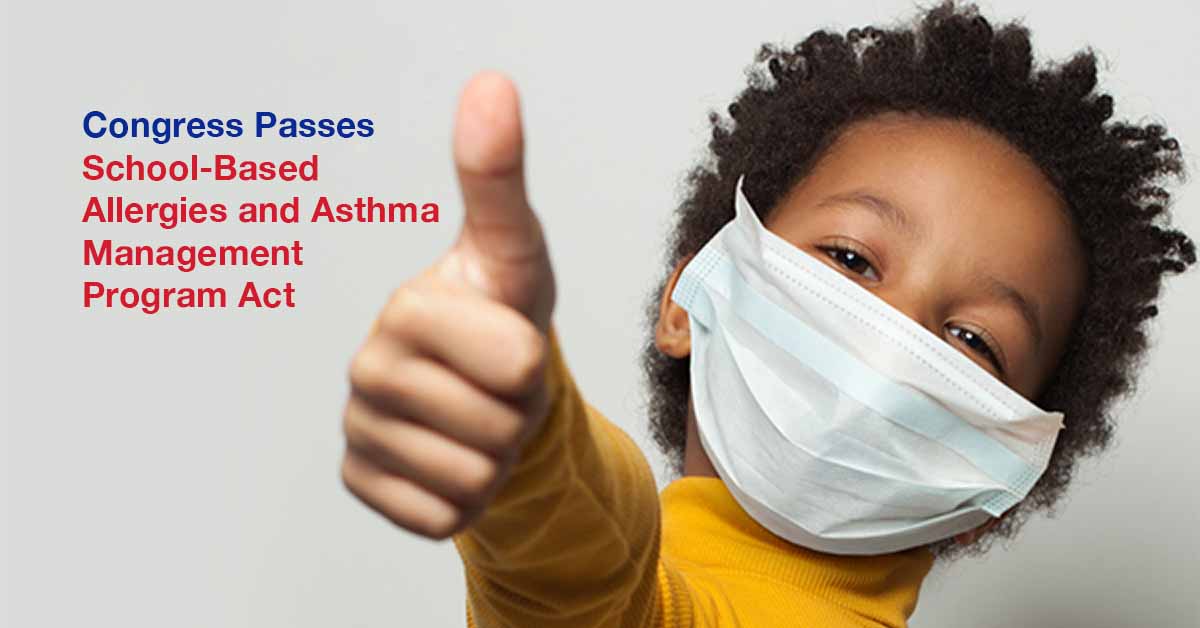Law gives greater protections and resources to students with asthma and allergies across the US
Washington D.C., Dec. 17, 2020 (GLOBE NEWSWIRE) — Today Congress passed H.R. 2468, the School-Based Allergies and Asthma Management Program Act. This bipartisan bill will help millions of U.S. children manage asthma and food allergies at school. It’s a health advocacy win the Asthma and Allergy Foundation of America (AAFA) is extremely proud of because its championed and supported this legislation from the start.
H.R. 2468 encourages states to improve allergy and asthma care in schools by giving preference for federal grants to states that adopt certain management programs and policies. In keeping with policy recommendations from AAFA’s State Honor Roll, states can earn financial rewards for putting the following in place:
- Methods to identify all students who have allergies or asthma
- Create individual student action plans
- Require school nurses or on-site trained staff during operating hours to administer medicines for both asthma and allergies
- Asthma and allergy training education for school staff
- Efforts to reduce indoor asthma and allergy triggers
- Coordinate management of care with families and health care providers
“Supporting this bill and working with Congress to make sure it passed in both the House and Senate has been at the top of AAFA’s priorities list for years. It means a lot to know that AAFA’s leadership and dedicated advocacy work made this legislation happen,” said AAFA’s CEO and president, Kenneth Mendez. “Schools continue to face enormous challenges both educating and keeping kids safe and healthy during a global pandemic. Senate passage of this bill helps to set the framework for meeting long-term health goals inside of schools. It might also help more schools get the resources they need while also managing COVID-19.”
According to the Centers for Disease Control, about 6 million U.S. children have asthma. An estimated 5.6 million suffer from food allergies, or a combination of both food allergies and asthma. Poorly controlled asthma and severe allergic reactions can be fatal. Asthma is currently the most common chronic disease among children. It is the leading cause of missed school days for students under age 18.
“This legislation can also play an important role in leveling the playing field inside of classrooms. Our report, Asthma Disparities in America: A Roadmap to Reducing Burden on Racial and Ethnic Minorities shows asthma is more common in Black and Hispanic children. They also experience more devastating outcomes compared to white children. Health inequity puts students of color at an unfair academic disadvantage. Healthier children at school usually means more class time. It means more time learning, achieving and succeeding. It also means fewer hospital stays and visits. We’re hoping this is the first of many laws that will help us make a difference in bringing an end to disturbing health inequities,” said Mendez.
In January 2020, Mendez testified before the U.S. House of Representatives Committee on Energy and Commerce Subcommittee on Health in support of H.R. 2468 emphasizing the significant role it can play in helping to save lives and curb asthma and allergy incidents. It’s a move which helped to push the bill through the House of Representatives this fall.
AAFA thanks House Majority Leader Steny Hoyer (D-MD) and Representative Phil Roe (R-TN) for their unwavering leadership on the bill and Senator Lamar Alexander (R-TN) for shepherding it through the Senate.
AAFA’s biggest thanks goes to our patient and family community. AAFA’s grassroots efforts led thousands of families who are impacted by asthma and allergies across the nation to get involved and contact their legislators. The bill is now headed to the White House where the president has 10 days to sign it into law.
- Community members can continue to support AAFA’s advocacy work with a secure donation here: AAFA Advocacy For School Health
- Be sure to check out AAFA’s COVID-19 resource for schools: COVID-19 and Asthma Toolkit for Schools
- AAFA and fellow nonprofit groups offer free and reduced cost training and resource materials for schools. These include our friends at the Elijah-Alavi Foundation, Food Allergy & Anaphylaxis Connection Team (FAACT), and the National Association of School Nurses (NASN).
##
About AAFA
Founded in 1953, AAFA is the oldest and largest non-profit patient organization dedicated to saving lives and reducing the burden of disease for people with asthma, allergies and related conditions through research, education, advocacy and support. AAFA offers extensive support for individuals and families affected by asthma and allergic diseases, such as food allergies and atopic dermatitis (eczema). Through its online patient support communities, network of local chapters and affiliated support groups, AAFA empowers patients and their families by providing practical, evidence-based information and community programs and services. AAFA is the only asthma and allergy patient advocacy group that is certified to meet the standards of excellence set by the National Health Council. For more information, visit www.aafa.org.
Kafi Brown, Public Relations Director Asthma and Allergy Foundation of America 2029741223 kbrown@aafa.org





